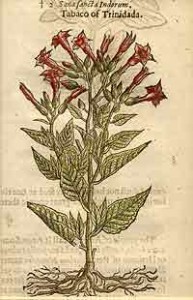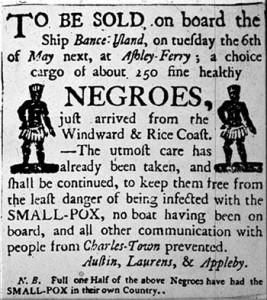I have graded your first papers. Take a look at my comments and we can talk about them next class. Below are some examples of papers that did a good job summarizing one of the primary sources (Equiano, Bacon, laws) and giving a little historical context (development of slavery, Virginia, etc). (I haven’t edited or included my comments on these papers.)
Example 1
Bacon’s Rebellion
In this document, Nathaniel Bacon, a “general by the consent of the people” in Virginia, lists the reasons the governor of the colony, William Berkeley, has acted against the King and endangered the settlers.[1] At the time of writing this, Virginia was under constant attack from Native Americans in retaliation to being pushed off their land. Bacon, in his declaration, blames the leaders of Virginia for this and lists the actions they took which not only led to aggression from the Native Americans, but were in direct violation of the King’s laws. 
Among these reasons, there are a few that stand out. His first complaint is that the leaders raised taxes for the common people and, instead of using the money to develop the colony, used it for personal reasons.[2] Here we see a prototype of one of the main struggles that led to the American Revolution: unfair taxation. Alongside this is Bacon’s position as an elected leader of the people, which mirrors the need for representatives of the common people that was also stressed during the American Revolution.
Bacon’s declaration is interesting because it proposes a lot of arguments that are very similar to those of the American Revolution. This document can be seen as the beginning of revolutionary sentiment in the British American colonies.
[1] Nathaniel Bacon, Declaration of Nathaniel Bacon in the Name of the People of Virginia (Virginia: Nathaniel Bacon, 1676), 2.
[2] Bacon, 1.
Example 2
In the source, African Olaudah Equiano Recounts the Horrors of Enslavement written in 1757 was about Equiano, a black male slave guiding one through his experience of captivity in an unfamiliar place. Documenting his experiences probably served the purpose to enlighten and bring forth the much needed reality to the conditions of slavery. During this time, when slavery was becoming prevalent due to a high demand for man power, concerns were directed more toward economic gain rather than the people providing this wealth mainly because the stories were usually untold by the slaves themselves. To be visually taken through Equiano’s explicit and raw descriptive details of his unwilling transition from being enslaved in his native home of Africa to bondage in the Caribbean’s alters ones perception of slavery. 
Equiano begins at the very moment when he and his sister were literally taken from their home. He says, “two men and a woman got over our walls, and seized us both, and they stopped our mouths, and ran off with us into the nearest wood”[i]. From there, Equiano describes their exhausting horrifying journey to a ship used for transporting slaves. Upon their arrival, we are given an image of not only the scenery surrounding the ship but a description of all the unfamiliarity’s of the people aboard. Equiano says, “Their complexions too differing so much from ours, their long hair, and the language they spoke, (which was very different from any I had ever heard) united to confirm me in this disbelief”[ii]. Here is when we get a glimpse of the fear that starts to arise within Equiano to the point where he feels his life is in jeopardy. Once aboard the ship, the truth behind the conditions the slaves were kept under in addition to the physical maltreatment provide by the white men, were explained through the eyes of a young boy in the midst of this horror.
The slave system led people to believe that it was beneficial and necessary for financial gain, omitting that this benefit would be at the cost of many lives, the deliberate neglect to mention how these human beings (slaves) were treated. As Equiano tells us, the masses of starving chained slaves stored within the ship like cattle, left to defecate in the very spot which they sat accumulating an unbearable smell, the constant suicide wishes and attempts accomplished by either the refusal to eat or jumping overboard, the cruel physical abuse disguised as punishment, instilling more fear from the vicious behavior these white men committed amongst one another, all to finally arrive to a place where they were sold like meat as the violence continued and heightened[iii]. So I ask, beneficial for whom? Equiano allows his readers to see firsthand what life was like as a black slave, the perspectives of the unheard, the ones actually experiencing this so called necessary system.


